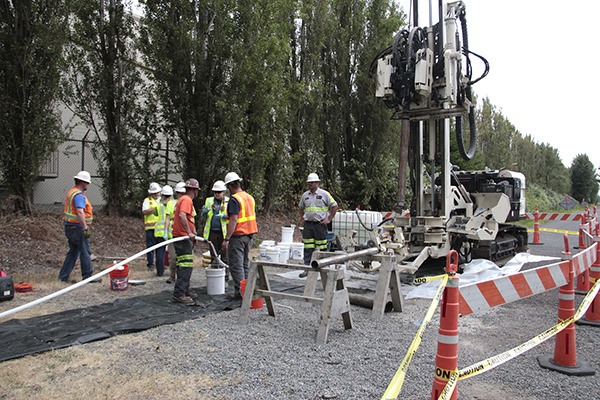Under the supervision of the state Department of Ecology (DOE), The Boeing Co. began sinking 12 monitoring wells and 14 probes in northeast Algona this week to confirm the location and determine the impact of groundwater contamination by trichloroethene (TCE).
TCE, also known as trichloroethylene, is a chlorinated hydrocarbon commonly used as an industrial solvent. The Boeing Co. used it in the 1960s, ’70s and ’80s to degrease and clean airplane parts. TCEs are known to be carcinogenic.
Last year, the DOE began the process to find out the extent of the contaminated groundwater, which likely originated on the Boeing-Auburn property.
“This phase of the investigation is to verify where the edge of impacted groundwater is at the site,” DOE Site Supervisor Neal Hines said. “Initially the investigation was on the Boeing property. In 2011 wells were sunk by Boeing, and the story has been that the northeast portion of Algona has had some impacted groundwater, but only the northeast corner. So the focus of the wells is pretty much in that part of Algona.”
Hines said 10 permanent monitoring wells will be sunk on public rights of way on 9th, 10th and 11th Avenues North, between state Route 167 and the Chicago Avenue drainage ditch. An additional well will be sunk in the commercial district along Milwaukee Avenue and another in the Junction neighborhood.
Additionally, 14 direct push borings will be dug.
“(They) are similar to a well, but you only get a snapshot sample,” Hines said. “In other words, it’s not a permanent well.”
Boeing will pick up the tab for the entire project.
After a few weeks to allow the equilibration of the wells, water samples will be taken and sent to labs for analysis.
“We’ll get the data back in another couple weeks,” Hines said. “When we get information about what is detected and what the concentrations are, we post it on the Ecology website.”
According to Hines, the testing already done by Ecology, including groundwater, home air and surface water testing, has not turned up TCE in concentrations that would be harmful to humans.
“These have been low level, low concentration detections when it is detected,” he said.
The sinking of the new wells is just the beginning of long process of cleanup expected to last several years.
“The next phase is a feasibility study, which evaluates the possible cleanup strategies,” Hines said. “Next is an actual plan, which Ecology writes.”
Hines continued:
Even after any clean up is finished, Hines said, the department will continue to monitor the site.
“We continue to look at whether it’s effective,” Hines said.
Ecology maintains a local phone line, 253-219-7645, for people to call with questions or concerns about the Boeing Auburn site investigation.


